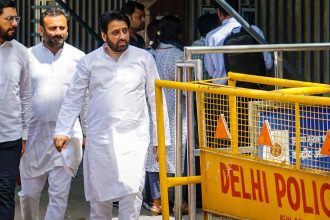
New Delhi: The Supreme Court is set to hear a batch of petitions challenging the constitutional validity of the Waqf (Amendment) Act, 2025, today. A three-judge bench, headed by CJI Sanjiv Khanna, will deliberate on whether an interim order is warranted before the final hearing.
The court has shortlisted five lead petitions from over 150 filed against the amended Act, streamlining the number of counsels eligible to argue the matter under the title In Re: The Waqf (Amendment) Act, 2025. Among the petitioners is AIMIM chief and Hyderabad MP Asaduddin Owaisi. Despite the narrowed list, the hearing is expected to be time-consuming, as several advocates have expressed their intent to raise different legal points.
The petitioners argue that certain provisions of the amended Act — particularly those mandating compulsory registration of all waqfs, including ‘waqf by user’, and the inclusion of non-Muslims in Waqf Boards and the Central Waqf Council — interfere with the religious autonomy guaranteed under Article 26 of the Constitution.
Centre defends legislation
In a comprehensive 1,332-page affidavit, the Union Ministry of Minority Affairs has defended the legislation, dismissing allegations of religious interference as a “mischievous false narrative”. The Centre maintains that the disputed provisions are secular in nature and have existed in some form for over a century.
The government’s affidavit also flagged what it termed as a “shocking” increase in waqf properties after the 2013 amendment, with an additional 20.9 lakh acres allegedly added to waqfs, taking the total to 39.2 lakh acres. The Centre contends that the 2025 amendments are aimed at curbing misuse and encroachment of public and private lands under the garb of waqf.
On April 17, the Supreme Court had granted the Centre a week to file its response, after which the government assured it would neither denotify waqf properties nor make fresh appointments to Waqf Boards or the Central Waqf Council until May 5. The Centre has opposed any interim order that would stay provisions of the Act, stating that judicial interference at this stage could disturb a legislative framework established by Parliament.
AIMPLB accuses govt of submitting incorrect data
Meanwhile, the All India Muslim Personal Law Board (AIMPLB) has accused the government of submitting incorrect and misleading data before the Supreme Court. It has called for action against the concerned officer in the Ministry of Minority Affairs for filing what it described as a “false affidavit”.
The Waqf (Amendment) Act, 2025 was passed by Parliament in April. The legislation was cleared in the Lok Sabha with 288 votes in favour and 232 against, while in the Rajya Sabha, 128 members supported the Bill and 95 opposed it. President Droupadi Murmu gave her assent to the legislation on April 5.










